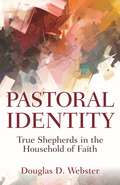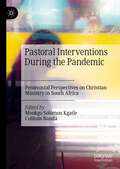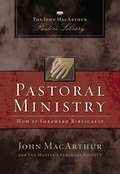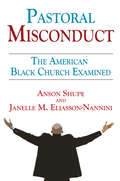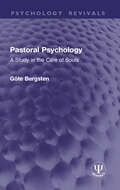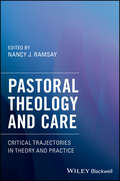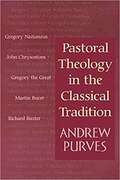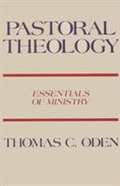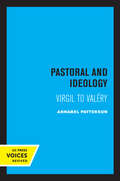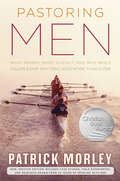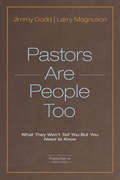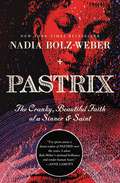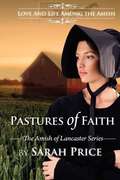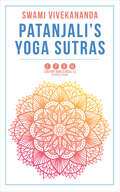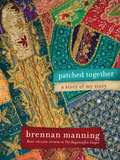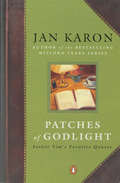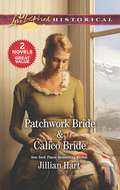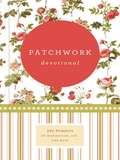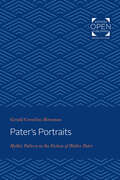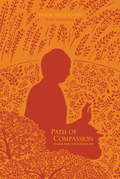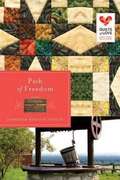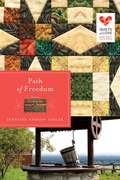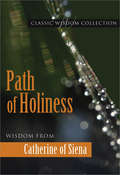- Table View
- List View
Pastoral Identity: True Shepherds in the Household of Faith
by Douglas D. WebsterWebster calls pastors to reject "Christendom" approaches to church leadership that require the pastor to exert control over the church's direction and ministry. Such models differ fundamentally from the New Testament "household of faith" vision of pastoral ministry, which affirms the disciple-making responsibility of the whole community, the priesthood of all believers, and the shared gifts of the Spirit. Rather than perpetuate pastoral leadership based on individual initiative, institutional power, and personal charisma, experienced pastor and seminary professor Douglas Webster defines a New Testament model of the pastor, outlining the major features of pastoring among the household of faith, such as: - Viewing the church as an every-member ministry - Seeking synergism between pastoral identity and congregational identity - Prioritizing a pastor's daily rhythms of grace in prayer, study, and care for the body - Supporting pastor-theologians who shepherd believers in the whole counsel of God Such pastoral authority and guidance require mutual submission in Christ. Pastors and laypeople alike let go of dominant cultural models of pastoring and embrace the values of Christ's kingdom.
Pastoral Interventions During the Pandemic: Pentecostal Perspectives on Christian Ministry in South Africa
by Mookgo Solomon Kgatle Collium BandaThis book provides an interdisciplinary exploration of the challenges faced by pastoral ministry in South African Pentecostalism as a result of the Covid-19 pandemic, as well as some interventions being made to manage these challenges. Contributors present descriptive approaches to churches’ reactions to lockdown measures, and especially the adaptations generated within Pentecostalism in South Africa. Through a variety of approaches—including pastoral care, virtual ecclesiology, social media, and missiology—contributors offer intervention techniques which can help readers to understand the unique role of Christian ministry during the pandemic, in South Africa and beyond.
Pastoral Ministry: How to Shepherd Biblically
by John F. Macarthur Master'S Seminary FacultyEncouraging, insightful, and challenging, Pastoral Ministry is designed for a new generation of shepherds who seek to lead with the passion of the apostles. Written by MacArthur and his colleagues at The Master's Seminary, this guide outlines the biblical priorities essential to effective ministry. Other contributors include: Richard L. Mayhue, James F. Stitzinger, Alex D. Montoya, James M. George, Irvin A. Busenitz, James E. Rosscup, Donard G. McDougall, Robert L. Thomas, David C. Deuel, George J. Zemek, and S. Lance Quinn.
Pastoral Misconduct: The American Black Church Examined
by Janelle M. Eliasson-NanniniIn the past, clergy malfeasance was mentioned only in passing by group members or adherents. The subject was invisible and those who studied it were often stigmatized as hostile to religion itself. Today clergy misconduct is acknowledged as a social problem with growing conceptual and theoretical implications. In Pastoral Misconduct, Anson Shupe and Janelle M. Eliasson-Nannini argue that the history and traditions of black pastoral leadership, coupled with the close identity of many black congregants with their pastor, congregation, and racial subculture, creates opportunity structures that facilitate predatory behavior. Familiarity and mutual identity frequently leads victims to drop their normal levels of wariness. Major denominations and minor sects have been studied, but this unique study by Shupe and Eliasson-Nannini pursues nuances of pastoral bad behavior in a new context. This book is not a tabloid treatment of the American black church. In fact, the black church becomes the vehicle for a major new sociological development: a theory of clergy misconduct in any minority religion.
Pastoral Psychology: A Study in the Care of Souls (Psychology Revivals)
by Göte BergstenOriginally published in 1951, unlike most books dealing with psychology and pastoral work at the time, this work is not concerned solely with the application of psycho-therapeutic principles to the work of the minister. It is dominated by the need for the pastoral care which the normal member of the Church needs. The author’s foremost aim is to show that pastoral psychology should find its own techniques; even if it uses the experiences of psychotherapy, it is to be considered as an independent form of personality treatment.His introductory chapter deals with the relationships between psychology and the care of souls and gives a historical survey. He then deals with the help that medical psychology can give pastoral psychology and gives an excellent chapter on methods of treatment. The problem of scepticism which Bergsten says can often be considered as a neurotic symptom, and the problem of real and apparent guilt are treated exhaustively and in a particularly fresh manner. He is very critical of the Freudian doctrine of sublimation. In his treatment of the dream problem Bergsten stresses the similarity between dream and drama and compares the dream with an old mystery play, which shows the way out of the actual conflict. Finally, he deals with Mental Illness and Religion and gives advice for the relatives of those who are mentally ill.Pastoral Psychology deals thoroughly with every aspect of the subject in a fresh and vivid manner. At the time it was a book from which the professional psychiatrist was thought to gain as much as the Minister or Pastor.
Pastoral Theology and Care: Critical Trajectories in Theory and Practice
by Nancy RamsayLeading pastoral theologians explore a wide variety of themes related to pastoral practice. Pastoral Theology and Care: Critical Trajectories in Theory and Practice offers a collection of essays by leading pastoral theologians that represent emerging trajectories in the fields of pastoral theology and care. The topics explored include: qualitative research and ethnography, advances in neuroscience, care across pluralities and intersections in religion and spiritualties, the influence of neoliberal economics in socio-economic vulnerabilities, postcolonial theory and its implications, the intersections of race and religion in caring for black women, and the usefulness of intersectionality for pastoral practice. Each of the essays offers a richly illustrated review of a practice of pastoral care relationally and in the public domain. The contributions to this volume engage seven critical directions emerging in the literature of pastoral theology in the United States and internationally among pastoral and practical theologians. While coverage of these topics does not exhaust important points of activity in the field, it does represent especially promising resources for theory and practice. This important work: Offers unique coverage of new directions in the field Includes contributions from an exceptional group of experts who are noted leaders in their areas of study Introduces the newest perspectives on pastoral care and offers constructive proposals Filled with case illustrations that make chapters pedagogically useful, Pastoral Theology and Care is essential reading for faculty, seminarians and students in advanced degree programs, and pastors.
Pastoral Theology in the Classical Tradition
by Andrew PurvesToo often pastoral care is uninformed by historical practice and is overly influenced by psychological theory and practice, according to Andrew Purves. At least one consequence of this is that it is often disaffiliated from the church's theological heritage. <p><p> Purves examines Christian writers from the past who represent the classical tradition in pastoral theology--classical in the sense that they and their texts have shaped the minds and practices of pastors in enduring ways. He reflects on texts from Gregory Nazianzus, John Chrysostom, Gregory the Great, Martin Bucer, and Richard Baxter. He includes a brief biography of each author, introduces the major themes in the writer's theology, and discusses the issues arising for pastoral work.
Pastoral Theology: Essentials of Ministry
by Thomas C. OdenThis book fully integrates principles of pastoral care, leadership, and theology to restore for ministers.
Pastoral and Ideology: Virgil to Valéry
by Annabel PattersonPatterson follows the fortunes of Virgil’s Eclogues from the Middle Ages to our own century. She argues that Virgilian pastoral spoke to the intellectuals of each place and time of their own condition. The study reinspects our standard system of periodization in literary and art history and challenges some of the current premises of modernism. This title is part of UC Press's Voices Revived program, which commemorates University of California Press’s mission to seek out and cultivate the brightest minds and give them voice, reach, and impact. Drawing on a backlist dating to 1893, Voices Revived makes high-quality, peer-reviewed scholarship accessible once again using print-on-demand technology. This title was originally published in 1987.
Pastoring Men: What Works, What Doesn't, and Why Men's Discipleship Matters Now More Than Ever
by Patrick MorleyWhat would happen if every pastor in America shared the vision to disciple every man in his church—can you imagine? No man falls on purpose, yet our culture is suffering from the fallout of the "men problem." Increasingly men are living autonomous and unexamined lives, getting caught up in the frenzy of life, and becoming satisfied with tasteless and powerless Christianity. Now, more than ever, men need unapologetic guidance and strong discipleship. Here's the place to start. In Pastoring Men, Patrick Morley explains proven and practical strategies for discipleship, equipping pastors to effectively reach and disciple all of the men they shepherd. This book will teach you:The state of men in your church—how they are doing, what they want, what keeps them from getting what they want, and what they needThe essential factors for successfully discipling menA concrete, sustainable strategy to help you organize your passion for men's discipleship without a lot of new programming. Read and apply Pastoring Men and see men, their families, and your church thrive.
Pastoring Men: What Works, What Doesn't, and Why Men's Discipleship Matters Now More Than Ever
by Patrick MorleyWhat would happen if every pastor in America shared the vision to disciple every man in his church—can you imagine? No man falls on purpose, yet our culture is suffering from the fallout of the "men problem." Increasingly men are living autonomous and unexamined lives, getting caught up in the frenzy of life, and becoming satisfied with tasteless and powerless Christianity. Now, more than ever, men need unapologetic guidance and strong discipleship. Here's the place to start. In Pastoring Men, Patrick Morley explains proven and practical strategies for discipleship, equipping pastors to effectively reach and disciple all of the men they shepherd. This book will teach you:The state of men in your church—how they are doing, what they want, what keeps them from getting what they want, and what they needThe essential factors for successfully discipling menA concrete, sustainable strategy to help you organize your passion for men's discipleship without a lot of new programming. Read and apply Pastoring Men and see men, their families, and your church thrive.
Pastors Are People Too: What They Won't Tell You but You Need to Know
by Jimmy Dodd Larry MagnusonWhat are your top twenty expectations for your pastor? Now multiply your list by the number of people who attend church with you. Is it any wonder pastors are overwhelmed and underappreciated? They're expected to know every member by name, preach a "home run sermon" every Sunday, condemn sin without hurting anyone's feelings, and be available to serve others 24/7 while not neglecting their own family. The intensity of these expectations and lack of appreciation can and does bring the majority of pastors to a place of despair and ultimately departure from pastoral ministry. This practical field guide offers tangible ways to better understand and care for the pastor who cares so deeply about you.
Pastrix: The Cranky, Beautiful Faith of a Sinner & Saint
by Nadia Bolz-WeberNow a New York Times bestseller, Nadia Bolz-Weber takes no prisoners as she reclaims the term "pastrix"(pronounced "pas-triks," a term used by some Christians who refuse to recognize female pastors) in her messy, beautiful, prayer-and-profanity laden narrative about an unconventional life of faith. Heavily tattooed and loud-mouthed, Nadia, a former stand-up comic, sure as hell didn't consider herself to be religious leader material-until the day she ended up leading a friend's funeral in a smoky downtown comedy club. Surrounded by fellow alcoholics, depressives, and cynics, she realized: These were her people. Maybe she was meant to be their pastor. Using life stories-from living in a hopeful-but-haggard commune of slackers to surviving the wobbly chairs and war stories of a group for recovering alcoholics, from her unusual but undeniable spiritual calling to pastoring a notorious con artist-Nadia uses stunning narrative and poignant honesty to portray a woman who is both deeply faithful and deeply flawed, giving hope to the rest of us along the way. Wildly entertaining and deeply resonant, this is the book for people who hunger for a bit of hope that doesn't come from vapid consumerism or navel-gazing; for women who talk too loud, and guys who love chick flicks; for the gay man who loves Jesus, and won't allow himself to be shunned by the church. In short, this book is for every thinking misfit suspicious of institutionalized religion, but who is still seeking transcendence and mystery.
Pastures of Faith (The Amish of Lancaster Book #3)
by Sarah PriceDaniel Lapp doesn't know what to make of the distant cousin from Ohio who is sent to live on his father's farm. But he does know that he isn't looking to settle down with anyone. He'd rather be left alone to work in the dairy barn and fields alongside his father. Yet, when Daniel begins to learn more about Rachel, he begins to see her in a different light and realizes that there is more to the quiet, stern cousin than meets the eye.
Patanjali’s Yoga Sutras
by Swami VivekanandaExplore the profound wisdom of Patanjali's Yoga Sutras – the timeless companion for your journey through of yoga and meditation. Unveil the secrets of this ancient text through a lucid and approachable translation by famed Hindu monk Swami Vivekananda, enriched with his insightful commentary. Embark on a transformative voyage with this indispensable volum
Patched Together
by Brennan Manning"Patched Together is a very special story to me. It is, in many ways, my story..."These words begin this rich story from Brennan Manning, the beloved author of The Ragamuffin Gospel. Follow the character Willie Juan, a lonely boy who finds belonging in the eyes of the mysterious Man of Sorrows, through three distinct seasons of his life: morning, noon, and night. Each season is filled with memorable characters, significant wounds, and lingering questions.More than a charming tale, Patched Together is a remarkable story in which readers will see themselves. Willie Juan and readers alike will be connected by the thread that ties all the patches together--the everlasting truth that in the end, only Abba's love remains.
Patches of Godlight
by Jan KaronWritten in Father Tim Kavanagh's own hand, this wonderful collection of quotes brings to life the personal reflections of Mitford's beloved Episcopal priest. Here Father Tim has carefully recorded his favorite quotes from a variety of thinkers, philosophers, and poets whom he has admired over the years. Next to the quotes are Father Tim's personal comments, scribblings, and doodlings. From C. S. Lewis and Mark Twain to Aristophanes and St. Paul, these heartwarming words on love, life, and faith are a perfect addition to the Mitford series-and a must-have for Jan Karon's millions of readers.
Patchwork Bride & Calico Bride
by Jillian HartLove and faith in Angel Falls, MontanaPatchwork BrideBack in Angel Falls, Montana, from her East Coast finishing school, Meredith Worthington is ready to follow her dream of becoming a teacher. And perhaps get to know Shane Connelly, the intriguing new wrangler on her father’s ranch. Shane has had enough of high society, yet he can’t resist Meredith’s charm. But will love have time to blossom before she discovers the secret he’s been hiding?Calico BrideSafe, predictable Angel Falls, Montana, is Lila Lawson’s home—but she secretly wishes for adventure. Then the new deputy stumbles into her father’s mercantile, gravely injured, and Lila gets more excitement than she can handle! A harsh childhood taught Burke Hannigan to get tough or give in. Lila’s compassion makes him yearn for more. But before he can ask her to forgive his outlaw past, he’ll have to forgive himself.
Patchwork Devotional
by Various AuthorsINVITE GOD INTO EVERY MOMENT. Life is a fabric woven together with small moments. Each day we drive to work, run errands, cook meals, make phone calls, and everything else in between. In the midst of it all, God stays beside us as a partner, protector, and father. In the Patchwork Devotional, 365 days of encouragement, hope, inspiration, and humor will tune our souls to God's presence--even in the small things. Writers include some of today's most dynamic authors and speakers: Patsy Clairmont, Natalie Grant, Nicole Johnson, Carol Kent, Marilyn Meberg, Sandi Patty, Jan Silvious, Luci Swindoll, Sheila Walsh, and Lisa Whelchel. If we take the time, day-by-day we can come to know the privilege of experiencing God's love for us in all things. We can learn to see everything--big and small--through his eyes.
Pater's Portraits: Mythic Pattern in the Fiction of Walter Pater
by Gerald Cornelius MonsmanOriginally published in 1967. Monsman undertakes a comprehensive critical analysis of Walter Pater's fiction, which presents the critic with numerous causes of frustration, not the least of which is a lack of both dramatic narration and description. Pater is rarely vivid and firsthand in his fiction; he tends instead toward exposition. Monsman's emphasis in Pater's Portraits is "tracing out" the conscious artistic structure of Pater's fiction. The scope of Pater's writings comprises nothing less than Western culture itself; its subject is all that man has written, thought, said, sung, hoped, or prayed as a civilized creature over two and one-half millennia. Pater's success in handling such panoply is attributable to his discovery of a coherent pattern by which art, religion, and life can be organized. Monsman aims to discover in Pater's fiction the use of old scientific-religious patterns of myth to explain moments of religious and cultural awakening, to reveal the way in which one man arrived at a credo that would answer to the desolation of life and culture.
Path of Compassion
by Thich Nhat HanhPath of Compassion is a collection of key stories from Thich Nhat Hanh’s classic Old Path White Clouds, a book celebrating its 20th publishing anniversary this year. It tells the fascinating life story of Prince Siddhartha, who left his family and renounced his carefully guarded life, and after many years of spiritual seeking became the Buddha, the Enlightened One. Far more than the description of an unusual life story, it serves as an enjoyable, compelling, and informative introduction to Buddhism by conveying its most important teachings in a compact and accessible format.Thich Nhat Hanh’s ability to show the Buddha as a person who deals with the same life issues as we do is unique and unsurpassed. Written in language accessible to readers of all ages and levels of experience Thich Nhat Hanh combines the description of the major life stages of the Buddha with his most important teachings. Reaching far beyond the biography genre Path of Compassion is a highly readable and informative introduction to Buddhism.
Path of Freedom
by Jennifer Hudson TaylorWhen Quakers Flora Saferight and Bruce Millikan embark on the Underground Railroad, they agree to put their differences aside to save the lives of a pregnant slave couple. With only her mother's quilt as a secret guide, the foursome follows the stitches through unknown treachery. As they embark on their perilous journey, they hope and pray that their path is one of promise where love sustains them, courage builds faith, and forgiveness leads to freedom.
Path of Freedom
by Jennifer Hudson TaylorWhen Quakers Flora Saferight and Bruce Millikan embark on the Underground Railroad, they agree to put their differences aside to save the lives of a pregnant slave couple. With only her mother's quilt as a secret guide, the foursome follows the stitches through unknown treachery. As they embark on their perilous journey, they hope and pray that their path is one of promise where love sustains them, courage builds faith, and forgiveness leads to freedom.
Path of Holiness
by Catherine Of Siena Mary Lea HillHow do I know if I'm living an authentic Christian life? Jesus calls each person to holiness, yet he calls each of us in a unique way. Where can we find the guidance we need as we walk along our paths to God? Catherine is a sure guide along the way of loving service to our neighbors for the sake of Christ.
